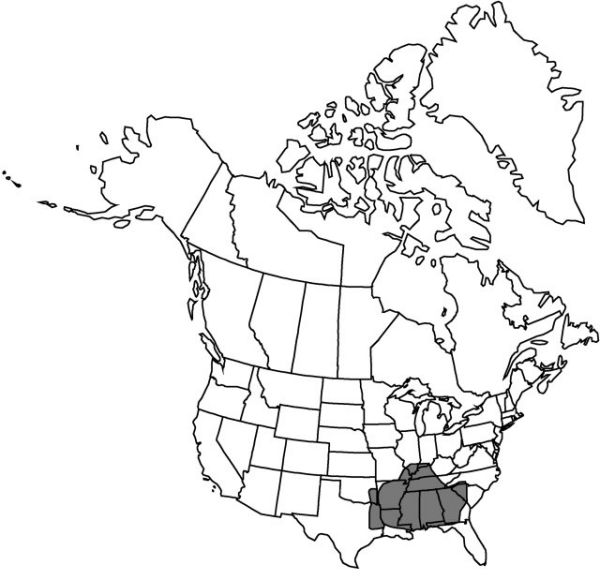Difference between revisions of "Hymenocallis occidentalis"
Enum. Pl. 5: 856. 1850.
FNA>Volume Importer |
FNA>Volume Importer |
||
| Line 1: | Line 1: | ||
{{Treatment/ID | {{Treatment/ID | ||
|accepted_name=Hymenocallis occidentalis | |accepted_name=Hymenocallis occidentalis | ||
| − | |accepted_authority=( | + | |accepted_authority=(J. Le Conte) Kunth |
|publications={{Treatment/Publication | |publications={{Treatment/Publication | ||
| − | |title= | + | |title=Enum. Pl. |
| − | |place= | + | |place=5: 856. 1850 |
| − | |year= | + | |year=1850 |
}} | }} | ||
| + | |common_names=Woodland;hammock;or northern spider-lily | ||
|basionyms={{Treatment/ID/Basionym | |basionyms={{Treatment/ID/Basionym | ||
| − | |name= | + | |name=Pancratium occidentale |
| − | |authority= | + | |authority=J. Le Conte |
| − | |publication_title= | + | |rank=species |
| − | |publication_place= | + | |publication_title=Ann. Lyceum Nat. Hist. New York |
| + | |publication_place=3: 146. 1836 | ||
}} | }} | ||
|synonyms= | |synonyms= | ||
| Line 17: | Line 19: | ||
|hierarchy_nav=<div class="higher-taxa"><div class="higher-taxon"><small>family</small>[[Liliaceae]]</div><div class="higher-taxon"><small>genus</small>[[Hymenocallis]]</div><div class="higher-taxon"><small>species</small>[[Hymenocallis occidentalis]]</div></div> | |hierarchy_nav=<div class="higher-taxa"><div class="higher-taxon"><small>family</small>[[Liliaceae]]</div><div class="higher-taxon"><small>genus</small>[[Hymenocallis]]</div><div class="higher-taxon"><small>species</small>[[Hymenocallis occidentalis]]</div></div> | ||
|volume=Volume 26 | |volume=Volume 26 | ||
| − | |mention_page=page | + | |mention_page=page 281, 286, 287, 288 |
| − | |treatment_page=page | + | |treatment_page=page 285 |
}}<!-- | }}<!-- | ||
| − | --><span class="statement" id="st-undefined" data-properties=""><b>Leaves </b> | + | --><span class="statement" id="st-undefined" data-properties=""><b>Bulb </b>nonrhizomatous, globose, 3.5–5.5 × 3–4.5 cm; basal plate 1–3 cm; neck 1.5–4 cm; tunic dark brown. <b>Leaves</b> deciduous, 5–12, arching to suberect, 3.5–6 dm × 2–6 cm, noncoriaceous; blade oblanceolate, shallowly channeled, distinctly wider beyond middle, tapering to petiolelike base, glaucous when young, apex subacute to acute. <b>Scape</b> (4–)5–7 dm, 2-edged, glaucous; scape bracts 2, enclosing buds, 4–7 × 1–1.5 cm, apex long-acuminate; subtending floral bracts 2.5–4.5 cm × 5–10 mm. <b>Flowers</b> 3–9, opening sequentially, with heavy, sweet fragrance; perianth tube green, slender, 7–13.5 cm; tepals slightly ascending, white, green-striped on keel, (7–) 8.5–11.5 cm × 5–10 mm; corona white with small, yellowish green eye, funnelform, shortly tubulose proximally, 2.5–4(–4.5) × 4–5.5 cm, margins between free portions of filaments often irregularly 3-dentate; free portions of filaments inserted on flat sinal base, nearly erect, white, 2.5–4 cm; anthers 1.3–2 cm, pollen golden; ovary ovoid, 0.8–1.5 cm × 4–7 mm, ovules 2–3 per locule; style green in distal 1/3, fading into white proximally, 13–23 cm. <b>Capsules</b> broadly triangular to subglobose, ca. 2.5 × 2 cm. <b>Seeds</b> subglobose, 1.5–2.1 × 1.2–1.6 cm.</span><!-- |
-->{{Treatment/Body | -->{{Treatment/Body | ||
| − | + | |distribution=North America. | |
| − | + | |discussion=<p>Varieties 2 (2 in the flora).</p> | |
| − | |||
| − | |distribution= | ||
| − | |discussion= | ||
| − | |||
|tables= | |tables= | ||
|references= | |references= | ||
}}<!-- | }}<!-- | ||
| − | --><!-- | + | --><div class="treatment-key"> |
| + | ==Key== | ||
| + | <div class="treatment-key-group"> | ||
| + | |||
| + | {| class="wikitable fna-keytable" | ||
| + | |-id=key-0-1 | ||
| + | |1 | ||
| + | |Leaves fresh at anthesis. | ||
| + | |[[Hymenocallis occidentalis var. occidentalis|Hymenocallis occidentalis var. occidentalis]] | ||
| + | |-id=key-0-1 | ||
| + | |1 | ||
| + | |Leaves withering before anthesis. | ||
| + | |[[Hymenocallis occidentalis var. eulae|Hymenocallis occidentalis var. eulae]] | ||
| + | |} | ||
| + | </div></div><!-- | ||
-->{{#Taxon: | -->{{#Taxon: | ||
name=Hymenocallis occidentalis | name=Hymenocallis occidentalis | ||
| − | + | |authority=(J. Le Conte) Kunth | |
| − | |authority=( | ||
|rank=species | |rank=species | ||
|parent rank=genus | |parent rank=genus | ||
|synonyms= | |synonyms= | ||
| − | |basionyms= | + | |basionyms=Pancratium occidentale |
|family=Liliaceae | |family=Liliaceae | ||
| − | + | |distribution=North America. | |
| − | |||
| − | |||
| − | |distribution= | ||
|reference=None | |reference=None | ||
| − | |publication title= | + | |publication title=Enum. Pl. |
| − | |publication year= | + | |publication year=1850 |
|special status= | |special status= | ||
| − | |source xml=https://jpend@bitbucket.org/aafc-mbb/fna-data-curation.git/src/ | + | |source xml=https://jpend@bitbucket.org/aafc-mbb/fna-data-curation.git/src/f50eec43f223ca0e34566be0b046453a0960e173/coarse_grained_fna_xml/V26/V26_545.xml |
|genus=Hymenocallis | |genus=Hymenocallis | ||
|species=Hymenocallis occidentalis | |species=Hymenocallis occidentalis | ||
Revision as of 21:50, 16 December 2019
Bulb nonrhizomatous, globose, 3.5–5.5 × 3–4.5 cm; basal plate 1–3 cm; neck 1.5–4 cm; tunic dark brown. Leaves deciduous, 5–12, arching to suberect, 3.5–6 dm × 2–6 cm, noncoriaceous; blade oblanceolate, shallowly channeled, distinctly wider beyond middle, tapering to petiolelike base, glaucous when young, apex subacute to acute. Scape (4–)5–7 dm, 2-edged, glaucous; scape bracts 2, enclosing buds, 4–7 × 1–1.5 cm, apex long-acuminate; subtending floral bracts 2.5–4.5 cm × 5–10 mm. Flowers 3–9, opening sequentially, with heavy, sweet fragrance; perianth tube green, slender, 7–13.5 cm; tepals slightly ascending, white, green-striped on keel, (7–) 8.5–11.5 cm × 5–10 mm; corona white with small, yellowish green eye, funnelform, shortly tubulose proximally, 2.5–4(–4.5) × 4–5.5 cm, margins between free portions of filaments often irregularly 3-dentate; free portions of filaments inserted on flat sinal base, nearly erect, white, 2.5–4 cm; anthers 1.3–2 cm, pollen golden; ovary ovoid, 0.8–1.5 cm × 4–7 mm, ovules 2–3 per locule; style green in distal 1/3, fading into white proximally, 13–23 cm. Capsules broadly triangular to subglobose, ca. 2.5 × 2 cm. Seeds subglobose, 1.5–2.1 × 1.2–1.6 cm.
Distribution

North America.
Discussion
Varieties 2 (2 in the flora).
Selected References
None.
Key
| 1 | Leaves fresh at anthesis. | Hymenocallis occidentalis var. occidentalis |
| 1 | Leaves withering before anthesis. | Hymenocallis occidentalis var. eulae |